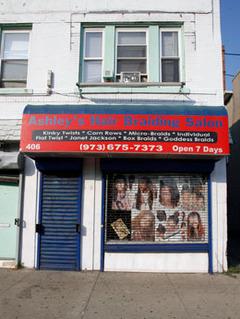African American Slaves
Discovered
Being Held In Captivity in East Orange in 2007
September 7, 2007
Federal agents yesterday arrested two men and a
woman from Togo who they say smuggled at least 20 girls and young
women from the West African nation and forced them to work
without pay at hair braiding salons in Newark and East Orange.

"This is a case of modern-day
slavery," said Tom Manifase, deputy special agent in charge
of investigations for U.S. Immigration and Customs Enforcement in
Newark, the lead agency in the investigation. "These women
were promised a better life in the U.S. but instead ended up
becoming victims of human trafficking."
Lassissi Afolabi, 44, Akouavi Kpade Afolabi, 39, and Dereck
Hounakey, 30, all of East Orange, were arrested at their homes
early yesterday. They were each charged with harboring illegal
aliens, which carries a maximum penalty of between three and 10
years in prison. In addition, Kpade Afolabi is charged with
smuggling illegal aliens for financial gain, which carries a
sentence of up to 10 years in jail.
At the two-family home in East Orange where authorities say the
Afolabis lived and housed several workers, Lassissi Afolabi's son
disputed the charges, saying the salon workers were well-treated,
paid and free to come and go as they pleased.
He showed a reporter around two disheveled bedrooms where he said
three of the salon workers lived. Each room had its own
television and closets that overflowed with clothes and shoes.
"They got everything they needed and it was better than
Africa," said Akl Afolabi, 19, who described Kpade Afolabi
as his aunt and the third suspect, Houkaney, as a family friend.
"Everybody was treated well. We helped them."
All three suspects are Togonese nationals who came to the United
States on visas, authorities said.
Hounakey is listed as the owner of Newark Hair Braiding on 18th
Avenue while Lassissi Afolabi owns Ashleys Hair Braiding on
Central Avenue in East Orange, both businesses where ICE
officials said the women were forced to work. Both businesses
were closed yesterday.
The women told investigators their travel documents were taken
from them and were told they'd be sent back to Africa if they
objected to working without pay, according to the federal
complaint.
If they complained or did not return home immediately after work,
one worker told investigators, the Afolabis would beat them.
The 20 women have been placed in protective
custody and will be given access to social services, including
emergency housing and psychological counseling provided by
nonprofit agencies who assist victims of human trafficking.
Original Story - September of 2007
Follow-up Story - May of 2008
Final Story - September of 2010

